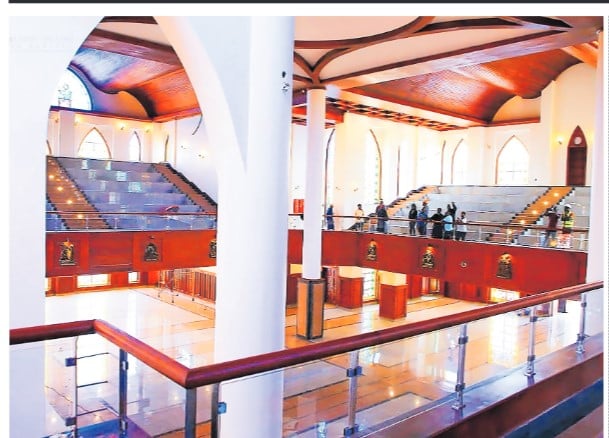Prime
Why are real estate prices so high?

The average price of two- and three-bedroom apartments in prime residential areas is $280,000 (about Shs100m and Shs120m). PHOTO/ISMAIL KEZAALA
What you need to know:
- Prices are determined by varying forces of demand and supply and people’s different tastes and preferences. In Uganda there is demand for low-cost housing caused by rapid population growth and urbanisation.
A number of factors go into determining the cost of property including location, size and the state of the real estate market at the moment.
In Kampala, the average price of two- and three-bedroom apartments in prime residential areas goes for $280,000 (about Shs100m and Shs120m) and $325,000, respectively, while an average four- to five-bedroom bungalows is $1m (about Shs360m).
According to experts the prices are high because demand is rising, due to improving investor confidence. Investors can also access credit advance easily.
According to Bank of Uganda, the real estate sector as a whole, comprising of mortgage and construction, increased 12.8 percent at Shs3.19t ($860.9m) in September 2019. This improved performance of the economy led to improved business and consumer confidence.
The prices are also being driven by demand for low-cost housing caused by rapid population growth and urbanisation. According to Uganda Bureau of Statistic (UBOS), there is a housing shortage of 2.1 million units, growing by 200,000 units annually. Kampala alone has a housing deficit of about 600,000 units.
Vibrant rental market
Another factor that makes Uganda’s real estate a lucrative business is its vibrant rental market. More people prefer to rent than to buy property. In Kampala, it is estimated that more than 71 percent of households rent their homes, according to Centre for Affordable Housing Finance in Africa (CAHF). Nationwide, more than one-fifth of all households rent.
Furthermore, the real estate market is unregulated particularly in Kampala and other urban areas. In this formal-informal market, more than 80 percent of transactions bypass the centralised registry. This, according to Dennis Juuko, a real estate agent, presents many possibilities for independent pricing.
Jjuuko notes that infrastructure development also tends to drive real estate prices high in Uganda.
He cites Zirobwe and Entebbe towns that are of a similar radius from Kampala but have different rates. While in Zirobwe, an acre is about Shs15m-Shs30m, in Entebbe an acre goes for around Shs1b.
“While many people live in Entebbe and work in Kampala, the same is not common for those in Zirobwe, because the level of infrastructure and development varies. Additional factors include security which matters in land pricing,” Jjuuko shares.
He says similarly, in the US and other developed countries, people can afford to work 100km away from home, a distance equivalent to Iganga from Kampala.
“Not many can move that distance in Uganda on a daily basis because it is exhausting. That is why we end up crowding areas that we believe have better development which pushes up the prices of plots,” he explains.
According to Rogers Matovu, a real estate consultant with Planet Estate Ltd, prices are determined by varying forces of demand and supply and people’s tastes and preferences. Unlike most developed countries, Uganda’s population is still increasing with 77 per cent below 30 years.
Matovu says real estate prices are shooting fast because of this fast growing young population that is feeding on a scarce resource (land).
“Additionally, our country size is small, even when compared with our neighbours such as South Sudan, Kenya, and Tanzania, which have vast chunks of land in comparison to their populations. With less pressure on the land, land prices in other countries are lower compared to Uganda because the factors of demand and supply of land apply differently for them,” he explains.
Price ceiling
In some areas, regardless of the development done, price of land will never change because the land market has reached its maturity. Case in point is Kololo, an affluent neighbourhood where the property market here cannot develop any further.

Housing estates such as Papuna Estates have become popular because there is demand for housing in Kampala. PHOTO/RACHEL MABALA
“If you bought a plot in Kololo, it will take time, say 10 years for its price to double because its property market has reached its price ceiling or maturity. On the other hand, if one bought an acre in Zirobwe, at Shs30m, even within a year, they can get someone to give them Shs45m as selling price,” Jjuuko points out. He says this trend applies to every virgin real estate site because majority of people can only afford land in developing areas.
“Therefore, if one built a storeyed house in Zirobwe, the plot next door will automatically appreciate in price because everyone will be attracted by the new development. That is not the case in Kololo no matter what kind of building you put in the plot,” he says. Could it be the reason we see several dilapidated buildings in these areas yet the land prices never change? Maybe.
Policies
Policies have a great impact on the economy and while developed countries have implemented policies that ensure their citizens have easier access to housing such as low interest fees on mortgages, Uganda still lags behind.
“Easy access to credit will go a long way in improving the real estate market. On the contrary, our mortgages are more business-oriented while in other economies such as the US, they are people growth-oriented. Additionally, countries such as Rwanda and the US have their government involved in the housing sector, thus a better story. Back home, it is run by the private sector that struggles to get money and must make profit.
“If it takes so much from me to get a house built, a plot surveyed and to get a land title, the buyer must foot this bill so I make a profit. If there were systems, working in an economy that is not laissez-faire, with better services, government involvement in the housing rather than leaving it to the private people who tussle to get capital, the outcomes would be different,” Matovu, a lecturer of real estate at Makerere University shares.
Cost of inputs
Inputs encompass land, cement, fuel where prices have been slapped with increasing taxes every financial year (Shs1,450 this year). Matovu says high fuel costs push the cost of land up because the realtor must factor in the transportation costs when pricing the land. On the other hand, Jjuuko says the price of cement in Uganda is high.
“Additionally, most homes must individually pay for the electricity poles which is a hefty sum. That aside, every property owner in Uganda, save for those in Bugolobi, Nakasero and a few other places, must dig a septic tank and a soak pit because there are no sewerage mains awaiting homeowners to connect. That is another Shs5m-Shs7m not forgetting the norm of building a perimeter wall, which is approximately Shs36m for a 50x100 plot. That amount can complete the construction of a home in other countries where most homes are on the streets and make use of street parking. While people may have their preferences regarding where to buy their plots, one thing to appreciate is that ours is a very young market and will be very expensive,” he asserts.
Culture
Unlike in other developed countries where owning a house does not improve one’s social status, in Uganda, owning one makes a man feel more manly than those who are renting. For example, when a spokesman says the intended son-in-law has a ‘non-moving house’, will garner him a lot of applause and prestige. Therefore, our culture plays a role in mounting pressure on us to build houses so whoever is renting longs for the day they will own their house.
“However, that is not the case in Germany because most people do not build but live in flats and when they age, say 70 years, they move into a home for elderly people. Therefore, the pressure to live in your own house in Uganda where one is only considered to be a man when they have their own house irrespective of whether they are urban or rural dwellers causes the prices of land to escalate,” Jjuuko shares.





